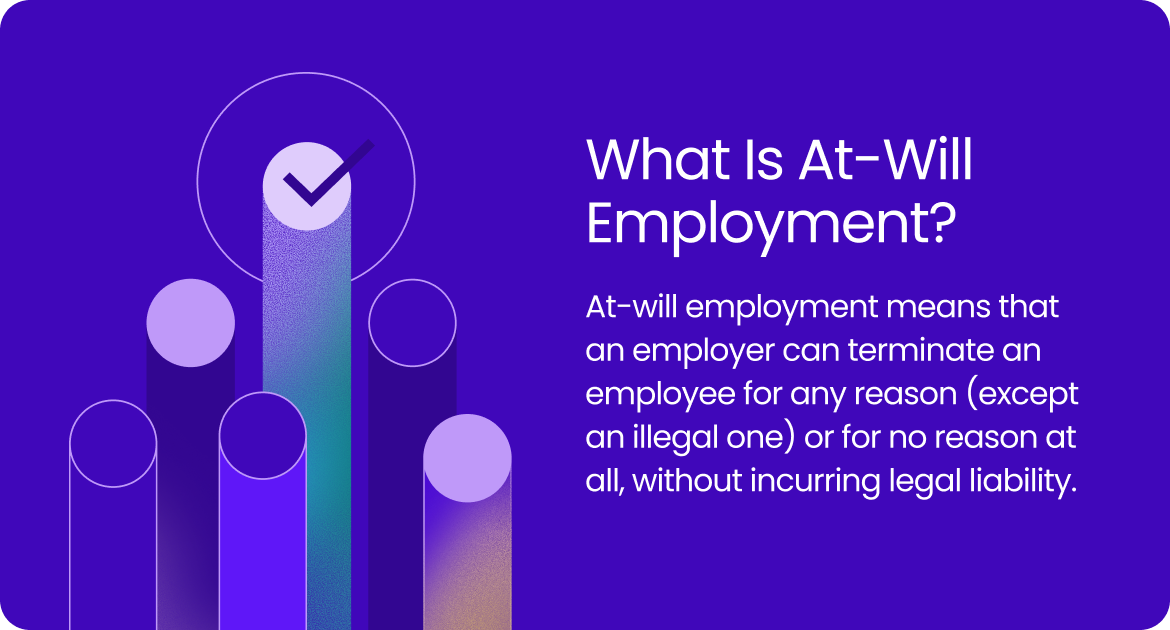As a business owner or human resources manager, you may come across the term "at-will employment" in the context of employment agreements. At-will employment means that either the employer or the employee can end the employment relationship at any time, for any reason, or for no reason at all, without prior notice. This arrangement provides flexibility for both parties but also requires careful attention to ensure that terminations do not violate any laws or contractual obligations.
For example, if an employee decides to leave the company, they can do so without providing notice, and the employer can also terminate the employee without giving a reason. However, it's important to note that even in at-will employment situations, terminations cannot be made for illegal reasons, such as discrimination based on race, gender, or other protected characteristics.

Key Aspects of At-Will Employment
- Termination without cause: Employers can fire at-will employees without providing a reason or establishing just cause. However, they cannot fire employees for illegal reasons such as discrimination or retaliation.
- No notice requirement: Neither employers nor employees are legally obligated to provide two weeks' notice when ending the employment relationship.
- Widespread application: Most non-contract employees in the private sector are considered at-will employees, including retail workers, office staff, and executives.
- State-specific regulations: All U.S. states, except Montana, follow the at-will employment doctrine, though many have exceptions.
Exceptions and Limitations
While at-will employment offers flexibility, it's not without restrictions:
- Illegal reasons: Employers cannot terminate employees for discriminatory reasons based on race, sex, age, disability, national origin, religion, or pregnancy status.
- Retaliation: Firing an employee for reporting discrimination or other protected activities is unlawful.
- Public policy exception: Many states protect employees from termination for actions benefiting the public interest, such as jury duty or reporting law violations.
- Implied contracts: Oral assurances or company policies may create expectations that contradict at-will status.
- Good faith and fair dealing: Some states bar employers from terminating employees in bad faith or for malicious reasons.
Impact on Job Security
At-will employment significantly impacts job security by creating an environment of uncertainty for employees. This employment arrangement allows employers to terminate workers without cause or notice, leading to potential instability in the workplace.
The lack of job protection in at-will employment can result in:
- Increased employee stress and anxiety due to the possibility of sudden job loss.
- Higher employee turnover rates, as workers can leave their positions at any time without consequences.
- Reduced long-term job security, particularly for high-level employees who may prefer contractual agreements.
Drawbacks for Employees
- Constant job insecurity and uncertainty
- Potential for unfair treatment or arbitrary dismissals
- Limited bargaining power in negotiations
- Difficulty in long-term financial and personal planning
- Reduced investment in company-specific skill development
While at-will employment offers flexibility for both employers and employees, it creates a work environment where job security is less guaranteed compared to contractual arrangements. Understanding the legal protections and exceptions to the at-will doctrine is crucial for both employers and employees navigating this complex aspect of employment law.
What are the main drawbacks of at-will employment for employees?
At-will employment presents several significant drawbacks for employees:
- Job insecurity: Employees can be terminated at any time without warning or reason, leading to constant uncertainty about their employment status1
- Increased stress and anxiety: The lack of job protection can cause employees to feel stressed and anxious about their job stability, potentially affecting their mental well-being.
- Reduced employee morale: The uncertainty associated with at-will employment can negatively impact workplace morale and team cohesion.
- Limited bargaining power: Employees may feel less empowered to negotiate better working conditions or benefits due to the fear of losing their job.
- Potential for unfair treatment: While illegal reasons for termination are prohibited, employees may still face arbitrary dismissals or feel vulnerable to workplace politics.
- Difficulty in long-term planning: The lack of job security makes it challenging for employees to make long-term financial or personal plans.
- Higher turnover rates: At-will employment can lead to increased employee turnover, which may result in a less stable work environment.
- Reduced investment in skill development: Employees might be less inclined to invest time and effort in developing company-specific skills due to the uncertainty of their position.
- Limited legal recourse: In most cases, employees have limited legal options if they are terminated without cause, as long as the reason is not illegal.
- Potential for abuse: Some employers might use the at-will doctrine to terminate employees for reasons that, while not illegal, may be unfair or unethical.
At-Will Employment FAQ

.png)
No, at-will employers do not need to have just cause to terminate an employee. The nature of at-will employment allows for termination without the need to establish or prove just cause.

.png)
While it's a common courtesy, there is no legal requirement for either employers or employees to provide two weeks' notice in at-will employment relationships. Either party can end the employment immediately without notice.

.png)
Most non-contract employees in the private sector are considered at-will employees. This can include: retail workers, office staff, entry-level positions all the way, through executives.
.svg)
.svg)
.svg)
.svg)
.svg)





.svg)




.svg)



















.svg)